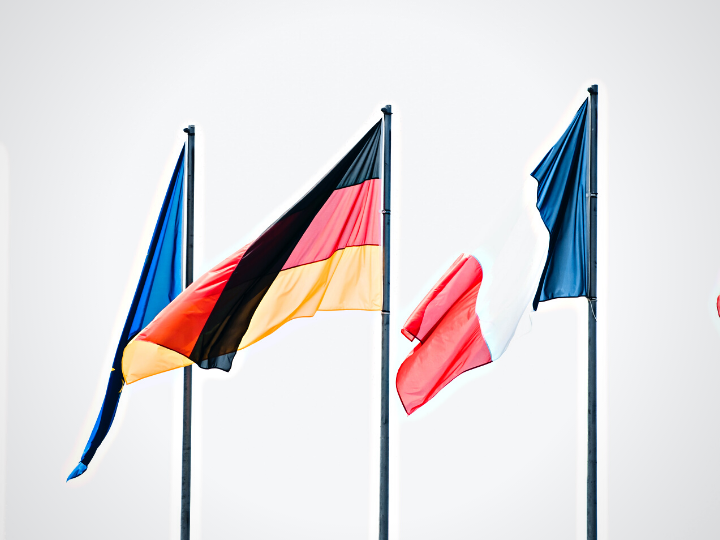by Jonathan Packroff
The German and French economy ministers on Monday (19 December) said Europe must match US subsidies for green industry and called for the EU to implement state aid rules to prevent distortions in the single market.
In January 2023, the US will start subsidising wind energy, electric cars, and other green industries to prioritise domestic production over competition from across the Atlantic through so-called “Buy American” clauses.
The subsidies, which are part of the American Inflation Reduction Act (IRA), have raised concern amongst EU institutions which fear that the policy could incentivise European companies to relocate to the US.
In a paper published on Monday, the two ministers for economic affairs of France and Germany, Bruno Le Maire and Robert Habeck, laid out their vision for maintaining the EU’s attractiveness for industry.
“Our common ambition is clear: to have the EU gain indisputable leadership on green industry,” Le Maire said in a statement. “Our industrial policy should not only help to deliver innovation and jobs but also to preserve our independence.”
To that end, France and Germany aim at a change of the EU’s state aid rules, which at present limit EU member states’ capacity to subsidise companies, with the aim of preventing distortions in the EU single market.
“The state aid framework should allow us to support and enable matching measures in targeted strategic sectors,” the paper reads, noting wind energy, solar power, heat pumps and hydrogen as potential sectors.
With that, EU member states would be in a position to counter US subsidies with their own government support in the same amount.
The proposal comes after negotiations with the US have not yet yielded sufficient progress, even after the visit of French President Emmanuel Macron to US President Joe Biden in late November and representatives of the European Commission met with US counterparts in early December.
The ministers said they are still hoping for concessions from the US, such as an exception for EU manufacturers from the ‘domestic content’ rules, which the US has implemented for its direct neighbours Canada and Mexico, with whom it has a free trade agreement.
However, they urged that the EU must prepare for the eventuality that talks with the US will not achieve this result, by updating the EU’s own subsidy rulebook.
Commission chief open to relaxing subsidy rules
The European Commission has signalled openness to relaxing the EU’s state aid rules in order to support key green industries.
“We have to adjust our own rules to make it easier for public investments to power the transition,” Commission president Ursula von der Leyen said in a speech on 5 December, in which she stressed the concerns of Europeans raised by the US subsidy package.
However, other Commissioners have been more careful about relaxing subsidy restrictions.
One caveat is that not all member states would be in an equal position to support their industries.
EU single market Commissioner Thierry Breton has therefore proposed for the EU to set up a new fund at the EU level, financed by joint borrowing. This is, however, strongly opposed by the German government, which stresses that many funds of the EU’s joint borrowing programme ‘Next Generation EU’ are still unused and could therefore be repurposed.
Other high-ranking members of the Commission have stressed that subsidising alone will not solve the key problems of European industries.
“You can’t build competitiveness on subsidies,” cautioned Commission Vice-President Margrethe Vestager. “Only a seamless, strong and well-functioning single market can provide for sustainable, long-term growth,” she wrote in a blog post published on the Commission website on Thursday (15 December).
Use qualitative criteria to benefit EU producers
In their joint paper, the French and German ministers focused not only on creating more subsidies, but how they are allocated.
So far, many subsidy schemes, such as tenders for renewable energy, as well as public procurements, have been awarded to those offers with the lowest price. However, they could also take “qualitative criteria” such as sustainability standards or reduction of environmental impact into consideration.
Current state aid rules allow for such non-price criteria to weigh up to 30% of the decision on how funding for green technologies is awarded.
Some member states have already been using such qualitative criteria. France, for example, is awarding subsidies for an offshore wind farm in Normandy mainly based on price (75% of the overall scoring), but also accounts for environmental impacts (15%) and local economic development (10%), according to business association WindEurope.
Germany, in contrast, considers using carbon emissions in the transport of subsidised products, such as wind turbines and solar panels, as a criterion, according to Habeck’s statements at an industrial conference on 29 November. This would implicitly benefit European manufacturers whose products by nature need to be transported over shorter distances for use in Europe.
Harmonising such criteria across Europe could be a job for the new “Clean Tech Europe” platform, set up by the European Commission, and praised by the German and French ministers as “an important step to bring all actors together”.
Setting up the platform “should be followed up quickly with concrete policy,” the ministers wrote.
*first published in: Euractiv.com




 By: N. Peter Kramer
By: N. Peter Kramer

